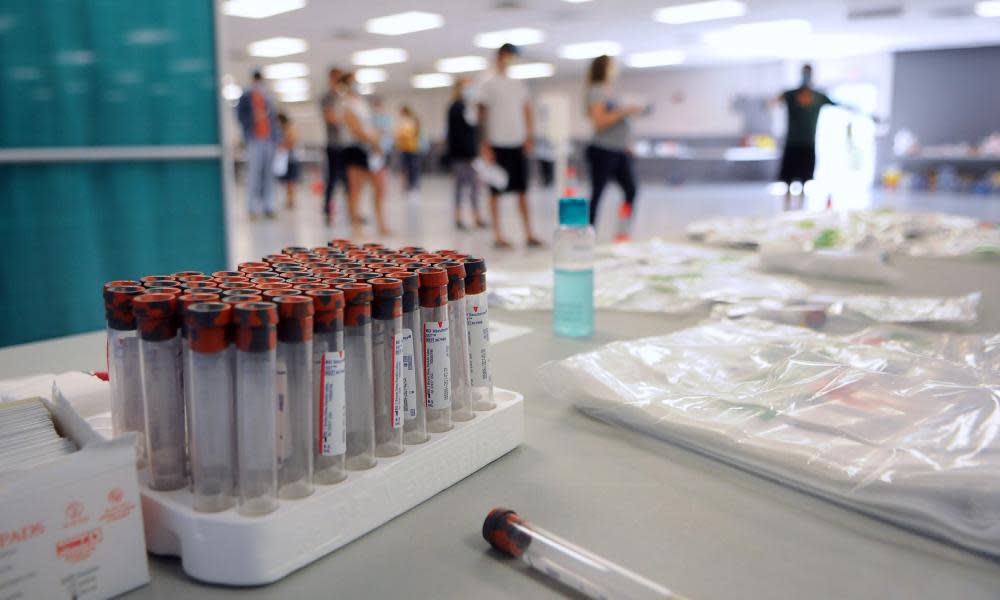Israel and Netherlands studies claim progress in Covid-19 antibody trials

Separate studies in Israel and the Netherlands claim to have created antibodies that can block the coronavirus infection, a potential future treatment touted as a game-changer until a vaccine becomes available.
A Dutch-led team of scientists said they had managed to halt infection in a lab setting. At the same time, the Israeli defence minister announced a state-run research centre had developed an antibody that he claimed could “neutralise [the coronavirus] inside carriers’ bodies”. It is unclear if the antibody has been tested in people, however.
Both efforts, which are in their initial stages, hope to eventually treat or prevent the development of the Covid-19 respiratory disease caused by coronavirus and stall the spread of the pandemic.
“Such a neutralising antibody has potential to alter the course of infection in the infected host, support virus clearance or protect an uninfected individual that is exposed to the virus,” said Berend-Jan Bosch from Utrecht University in the Netherlands.
default
The research, published in the Nature Communications journal on Monday, looked at antibodies developed to combat the 2002-04 Sars outbreak, also caused by a coronavirus. It said it identified one antibody that was also effective against the current virus, officially called Sars-CoV-2.
Scientists at Utrecht University, Erasmus Medical Center and the global biopharmaceutical company, Harbour BioMed (HBM), described it as “an initial step towards developing a fully human antibody to treat or prevent” Covid-19.
“This is groundbreaking research,” said Jingsong Wang, the CEO of HBM. But he added: “Much more work is needed to assess whether this antibody can protect or reduce the severity of disease in humans.”
The study was welcomed with cautious optimism by several experts.
Jane Osbourn, the chair of the UK BioIndustry Association (BIA) who received an OBE last year for her antibody research, said the study “could be a valuable part of the future arsenal of options for development”.
Contact tracing is one of the most basic planks of public health responses to a pandemic like the coronavirus. It means literally tracking down anyone that somebody with an infection may have had contact with in the days before they became ill. It was – and always will be – central to the fight against Ebola, for instance. In west Africa in 2014/15, there were large teams of people who would trace relatives and knock on the doors of neighbours and friends to find anyone who might have become infected by touching the sick person.
Most people who get Covid-19 will be infected by their friends, neighbours, family or work colleagues, so they will be first on the list. It is not likely anyone will get infected by someone they do not know, passing on the street.
It is still assumed there has to be reasonable exposure – originally experts said people would need to be together for 15 minutes, less than 2 metres apart. So a contact tracer will want to know who the person testing positive met and talked to over the two or three days before they developed symptoms and went into isolation.
South Korea has large teams of contact tracers and notably chased down all the contacts of a religious group, many of whose members fell ill. That outbreak was efficiently stamped out by contact tracing and quarantine.
Singapore and Hong Kong have also espoused testing and contact tracing and so has Germany. All those countries have had relatively low death rates so far. The World Health Organization says it should be the “backbone of the response” in every country.
Sarah Boseley Health editor
James Gill, honorary clinical lecturer at Warwick Medical School, said it revealed “a potential game-changing discovery with regard to Covid-19”. However, he warned it was still too early to declare victory.
“Simply because we have found an antibody which neutralises a virus in a group of cells in a lab Petri dish doesn’t mean that we can expect the same response in patients, nor expect to see a positive change in a patient’s clinical condition,” he said. “But this is certainly a very promising discovery, coming from a robust scientific approach, and should be viewed as a reason for optimism.”
In Israel, the defence minister, Naftali Bennett, claimed researchers had made a “significant breakthrough”.
The state-run Israel Institute for Biological Research (IIBR) had created antibodies that could defeat the coronavirus inside humans, he said in a statement.
Researchers were already moving to patent the antibodies, and the IIBR was looking to mass-produce it, the statement said. It was not clear what the timeframe was for the treatment being widely available.
The Guardian has contacted the Israeli ministry of defence to ask if the antibody had been used in a human trial.
Both the Israeli and Dutch studies use monoclonal antibodies, which are lab-created proteins that resemble naturally occurring antibodies that make up the immune system. Antibodies work by binding with the virus, identifying it to be destroyed.
Roughly 100 other research groups around the world are also pursuing vaccines, which would provide immunity from infection.

 Yahoo News
Yahoo News 
